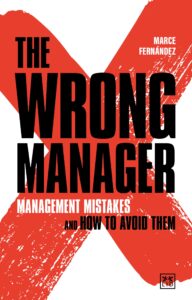|
Managers are too Often Wrong by Marce Fernández
By Guest Contributor Marce Fernández
Author of The Wrong Manager, Marce Fernández, explains why managers make mistakes so often.
You may remember Stephen Wozniak. Working for Hewlett Packard, he created the first personal computer. He tried to convince his bosses of the potential of the new machine, but they didn’t see it. So, Wozniak left to create Apple with Steve Jobs. You may also remember that marketing campaign, the “Pepsi Challenge”. To counteract its effect, Coca-Cola decided to change its formula and align it with the Pepsi flavour, which provoked an almost furious reaction from many of their customers. The name John Meriwether may ring a bell. He created Long Term Capital Management (LTCM), a hedge fund that became hugely popular on Wall Street in the 1990s. After some lousy trades, they incurred huge losses and put the entire financial market at risk.
The three cases above are well-known wrong decisions with one thing in common: they were made by top executives who were the best in their fields at the time. We could bring here an endless list of business mistakes and cases that happened in the past and continue to happen today. Managers and executives do not always make the right decisions no matter how well trained they are, and sometimes no matter how long and diverse their experience is. At the end of the day, though many find it hard to admit, they are normal people with their limitations and weaknesses.
Some authors and professors have already drawn attention to the fact that managers get wrong when making decisions. For example, Nadia Papamichail has reminded us of the various studies that “revealed that decision-makers often take bad decisions (Janis, 1989), solve the wrong problem (Forrester, 2003) and cannot cope with uncertainty (Bazerman, 2002).” These circumstances result in huge losses for organisations every year. It is worth turning this around. That is why I have written The Wrong Manager.
What we must consider a management mistake?
If we want to study management errors, the first thing to do is agree on the concept of management error. It is not such a simple issue. Should we consider it a mistake for not being the best possible option one can handle? In that case, how do we know which option was the best? Do we have to know them all? How could we measure them if we can only apply one? Is it a good decision just because it made our company some money? Or is it because whoever made the decision followed a reasonable decision process?
Nobel Laureate Gary Klein states that: “Poor outcomes are different from poor decisions… …Simply knowing that the outcome was unfavourable should not matter. Knowing what you failed to consider would matter.” Gustavo Barros, in his article about Herbert Simon’s concept of rationality, gives another complementary clue when he writes: “Simon’s research in the area of cognitive science demonstrated that, in complex situations, the choice taken and its result strongly depended on the particular process that generated it, and not only on the objectives that oriented it.”
I asked almost a hundred managers for their opinion on what we should consider a management mistake. I gave them four possible answers:
| a) The best option of all the possible alternatives |
| b) Any decision which provides a good result to the organization |
| c) Any decision made after a thorough process of analysis and consistent with the objective pursued |
| d) Both b) and c) look correct to me |
A wide majority of those surveyed favoured a flexible interpretation of what should be considered a ‘good decision,’ accepting both that which generates a good result and that which follows a strict process of analysis. So, it could be inferred that a bad decision would be the one that either does not follow a complete process or does not obtain a good outcome.
Why is so difficult to distinguish between a right and a wrong management decision? McCall & Kaplan states: “Given this complexity, it is no surprise that the consequences of managerial action are not always clear victories or defeats.” Complexity is the key. Any management decision involves a wide range of elements, some of which are unpredictable. Imagine, for example, the decisions made in the energy and cereal industries just before the invasion of Ukraine. Everything changed so dramatically that most decisions will probably end in failure even though they were made on a pretty solid foundation.
Having studied the literature on decision making and listened to a cross-section of managers, I have developed the following matrix to further explore the distinction between a good and a bad management decision. The matrix takes into account the three influencing factors: process, outcome and unpredictable forces.
In my book The Wrong Manager, I elaborate on the two variables that define the axes of the matrix and on the results of each cell. But I hope that the matrix alone helps you understand the approach to the analysis done.

Do we make more or fewer mistakes?
Two of the three elements – process and unpredictable factors – of the matrix increase the level of difficulty every day. The process must take into account new and more complex elements. Unpredictable factors are becoming more and more unpredictable. This is why today’s managers make more management mistakes than ever before, because while the capabilities of the human mind hardly change over the years, the complexity of the environment is continuously increasing.
We talk of the VUCA context according to which the business scenario is Volatile (unexpected changes of the environment), Uncertain (difficult to identify the key factors and how they affect a situation), Complex (new factors involved and new realities to take into account) and Ambiguous (the cause-effect relationships are not at all clear). I would add the unlimited alternatives available; decisions are no longer straightforward. Now the alternatives are each and every one that the decision maker can figure out.
In his book The Third Wave, written as early as 1980, Alvin Toffler warned how managers were faced with too many decisions to make too fast and on too many strange problems, pushing them into an unknown situation. Since 1980, the evolution has become much more rapid, turbulent and intricate. So today, in 2022, it is time to change the way managers take decisions if they want to avoid making too many mistakes. The Wrong Manager shows the pathway to follow.
ABOUT THE AUTHOR

Marce Fernándezis a management consultant and MBA educator. Prior to that, he was a senior executive in banking for 15 years. He is based in Spain.
Suggested Reading
 This book unravels the mystery that lies between success and failure, focusing on management mistakes. It uncovers the reasons behind most decision errors and shows how to deal with them successfully. It proposes a better approach to goal setting, risk assessment, context analysis, information processing, number crunching and personnel management. It also gives the keys to overcoming the long list of cognitive biases that managers suffer from (whether they know it or not). The book is written from the diverse and rich experience of the author and is based on the examples of dozens of real business mistakes.
This book unravels the mystery that lies between success and failure, focusing on management mistakes. It uncovers the reasons behind most decision errors and shows how to deal with them successfully. It proposes a better approach to goal setting, risk assessment, context analysis, information processing, number crunching and personnel management. It also gives the keys to overcoming the long list of cognitive biases that managers suffer from (whether they know it or not). The book is written from the diverse and rich experience of the author and is based on the examples of dozens of real business mistakes.
